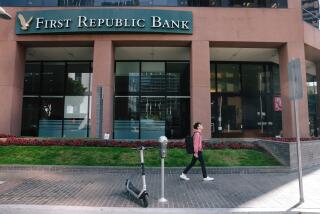Liberty to Turn to Institutional Investors : Offering: The Huntington Beach bank takes this unusual step after seeing little interest among private investors. The goal: up to $3 million.
- Share via
HUNTINGTON BEACH — Failing to generate much interest among private investors, Liberty National Bank is taking its unusual public offering to institutional investors in an effort to raise up to $3 million in cash to spur its growth.
The offering, which combines insured certificates of deposit with options to buy newly issued common stock, is designed to raise up to $3 million in new capital and nearly $20 million in deposits for the Huntington Beach institution.
But after privately pitching the program to wealthy individuals for six months, the bank has raised only a small portion of that amount--about $150,000 in capital and $1 million in deposits.
“It hasn’t moved like we wanted it to, but we’re not extremely upset over those figures,” said James Ott, the bank’s chief financial officer. “Now we plan to go to institutional investors through May 3.”
Starting next week, the bank will be inviting managers of pension funds and other asset managers to its private presentations, Ott said.
As one way to attract institutional investors, Liberty listed its stock last week on the National Assn. of Securities Dealers Automated Quotation system, a move that will make the bank’s shares “more accessible to a larger investor group,” Philip S. Inglee, Liberty’s president, said in a statement.
The stock has been trading between $3.25 and $3.75 a share in its first week, Ott said. It closed Wednesday at $3.50 a share, unchanged from Tuesday’s close.
Before listing with NASDAQ, Liberty’s stock was traded through several companies, known as market makers, who establish a price at which they will buy and sell shares.
Always seen as a healthy, well-run bank, Liberty wants to preen itself to attract a possible suitor once nationwide interstate banking comes to California in July, Inglee has said. And if it doesn’t attract a buyer, it must build itself up for stiffer competition and for better returns than the record $1.6 million it earned last year.
To be noticed, though, Liberty figures that it needs to grow larger quickly. It had only $137 million in assets at the end of December, and Eastern bankers have said publicly that they won’t look at a bank unless it has $500 million in assets, though they might buy a smaller one with a solid specialty such as Liberty’s, which concentrates on commercial lending to small businesses.
But Liberty can’t grow faster without more capital, its final reserve against losses. The CD-stock option was designed to offer investors a no-lose situation while raising the needed capital for the bank.
The hybrid security comes in units of $10,000. Each unit gives investors a federally insured $8,500 CD that matures in four years and $1,500 in warrants to purchase 1,200 shares of bank stock in the next three summers.
The purchase price of the shares would be 1.1 times the value of the equity that shareholders have on the bank’s books the previous Dec. 31. If stock is selling above the book value, investors could sell at a profit, excluding the price of the warrants. If investors decide not to buy, they would end up with more than $10,000 with the interest on their CDs.
Some analysts have called the unusual security a model for raising money, but others have viewed it as too complicated for investors to understand easily.
More to Read
Inside the business of entertainment
The Wide Shot brings you news, analysis and insights on everything from streaming wars to production — and what it all means for the future.
You may occasionally receive promotional content from the Los Angeles Times.









